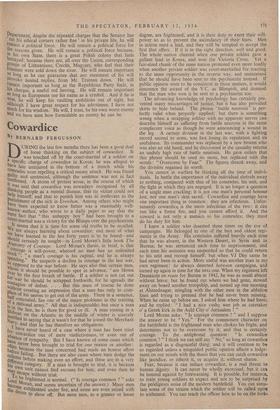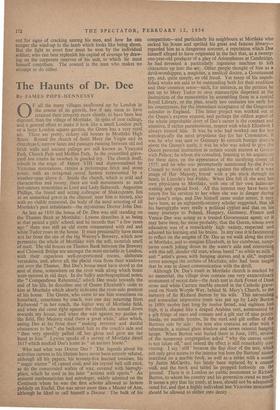Cowardice
By BERNARD FERGUSSON URING the last few months there has been a good deal r) of loose thinking on the subject of cowardice. It was touched off by the court-martial of a soldier on au sPecific charge of cowardice in Korea; he was alleged to have lain uninjured in the bottom of a trench while his comrades were repelling a critical enemy attack.. He was found guilty and sentenced, although the sentence was not in fact F°Pfirmed. A storm of protest arose, in the course of which it was said that cowardice was nowadays recognised by all thinking people as a mental disease, that its victim could not elP himself, and that to punish him was as irrelevant as the rnishment of the sick in Erewhon. Among others who might k„ave been expected to know better was a reasonably well- -4°Nvn author, who wrote to a daily paper to say that the mere fact that "this unhappy boy" had been brought to a eftrt-martial was a victory for the Blimps over the psychiatrists. seems that it is time for some 'old truths to be recalled. we are always learning about cowardice; and most of what ,w1be have learned in the last forty years is to be found--and should certainly be sought—in Lord Moran's little book The Wnatonly of Courage. Lord Moran's thesis, in brief, is that _ courage is will-power, whereof no man has an unlimited :toek aPending." "a man's courage is his capital, and he is always He suspects a decline in courage in the last war, 2, cPPosed to the war before He says also that certain men, ownorn it should be possible to spot in advance, "are blown fr‘sier by the first breath of battle. If a soldier is not cut out c-I. war he should be scrapped forthwith, for he spreads the wOntagion of defeat. . . . But this must of course be done ebout creating an impression that a man has only to corn- giltn of his nerves to get out of the army. There in a sentence, ,g" concealed, lies one of the major problems in the training ' ,a !rational army." All that is indisputable; but once a man ',11 the line, he is there for good or ill. A man tossing in a • uset7t on the Atlantic in the middle of winter is scarcely _. ned in saying that it wasn't for that he joined the Merchant 4,v,3:, and that he has therefore no obligations. fo; have never heard of a case where a man has been tried abs cowardice out of mere vindictiveness, or even out of havenee of sympathy. But I have known of some cases which ottee never been brought to trial for one reason or another : before failing. use the man concerned had made an honest effort eohle lading. But there are also cases where men dodge the JIM before making even an effort, and these are, in a very hrent category. If a man is brought to trial, it is because ma y° unit cannot find excuses for him; and even then he ,.1: escape without trial. Lord° be frightened is normal. ("Is courage common ? " asks beeo Moran, and seems uncertain of the answer.) Many men the Te exhilarated under fire, and some are even seized with desire to show off. But most men, to a greater or lesser degree, are frightened; and it is their duty to exert their will- power so as to prevent the ascendancy of their fears. Men in action need a lead, and they will be tempted to accept the first that offers. If it is in the right direction, well and good. The whole nation cheered when one private soldier gave a gallant lead in Korea, and won the Victoria Cross. Yet a fair-sized chunk of the same nation protested even more loudly when another private soldier was court-martialled for reacting to the same opportunity' in the reverse way, and maintained that he should have been sent to the psychiatrist instead. If public opinion were to be consistent in these matters, it would denounce the award of the V.C. as Blimpish, and demand that the man who won it be sent to a psychiatrist too. The advancing knowledge of psychology has certainly pre- vented many miscarriages of justice, but it has also provided skirts to hide behind. The phrase battle neurosis' is per- fectly valid when properly applied; but there is something wrong when a strapping soldier with no apparent nerves can describe himself as suffering from battle neurosis in the same complacent voice as though he were announcing a wound in the leg. A certain division in the last war, with a fighting record second to none, was fast losing its reputation and its usefulness, its commander was replaced by a new broom who was also an old hand; and he discovered in the sasualty returns an unduly high rate of battle neurosis. He gave orders that this phrase should be used no more, but replaced with the words: "Overcome by Fear." The figures shrank away, and the division regained its worth. You cannot in warfare be thinking all the time of indivi- duals. In battle the, importance of the individual shrivels away to nothing, compared with that of his comrades, his unit, and the fight in which they are engaged. It is no longer a question of a single man cracking; it is not one man's personal honour lost, nor one man's skin saved. Cowardice and courage have one important thing in common: they are infectious, Unfor- tunately cowardice, is the more infectious of the two: it can run like a forest fire, and you cannot afford it. And the coward is not only a menace to his comrades; they must do his duty for him. I' knew a soldier who deser,ted three times on the eve of campaigns. He belonged to one of the best and oldest regi- ments in the Army. His comiades suffered heavily each time that he was absent, in the Western Desert, in Syria and in Burma; he was sentenced each time to imprisonment, and each time his sentence was suspended so that he could return to his unit and recoup himself; but when Vi Day came he had never been in action. More useful was another man in my own regiment: he always deserted between campaigns, and turned up again in time for the next one. When my regiment left Damascus en route for Burma in 1942, he was as usual absent without , leave; but he found out where we had gone, stowed away on board another troopship, and turned up one morning at Ahmednagar, mingling with the other men in the ablution lines and trying to pretend that he had never been missing. When he came up before me, I asked him where he had been; and he replied : I had a nice cushy wee job as caretaker o' a Greek kirk in the Auld City o' Jerusalem ! " Lord Moran asks: "Is courage common ? " and I suppose the answer to be "Yes.", For the commonest character on the battlefield is the frightened man who chokes his fright, and determines not to be overcome by it; and that is certainly courage. To the antiphonal question: "Is cowardice common? " I think we can still say No," so long as cowardice is regarded as a disgraceful thing; and it will continue to be so regarded unless a misguided public opinion affects a lodge- ment on our minds with the thesis that you can catch cowardice like jaundice, or inherit it, or acquire it, without shame. out for signs of cracking among his men, and how he can temper the wind-up to the lamb which looks like being shorn. But the fight to avert fear must be won by the individual soldier, who can best replenish his capital of courage by draw- ing on the corporate reserves of his unit, to which he must himself contribute. The coward is the man who makes no attempt to do either.



































 Previous page
Previous page